With hundreds of pig breeds out there, it’s overwhelming for beginner farmers or homesteaders to decide which pig breed they want for meat.
The main questions to ask yourself before making the decision are the following:
- What kind of environment will the pig be raised in?
- A large pasture?
- A wooded area?
- Small enclosure?
- What kind of climate will the pigs be exposed to?
If you know how you would like to raise your meat pigs, you are now ready to narrow down the likely breeds for your small farm.
Whether they are a commercial breed, heritage breed, or cross-breed, each of these pigs will have different advantages in different contexts.
Your choice of pig will also depend partly on what kind of meat you prefer.
This article will give you an overview of these pigs’ characteristics to help you make the best possible choice.
Table of Contents
ToggleHereford
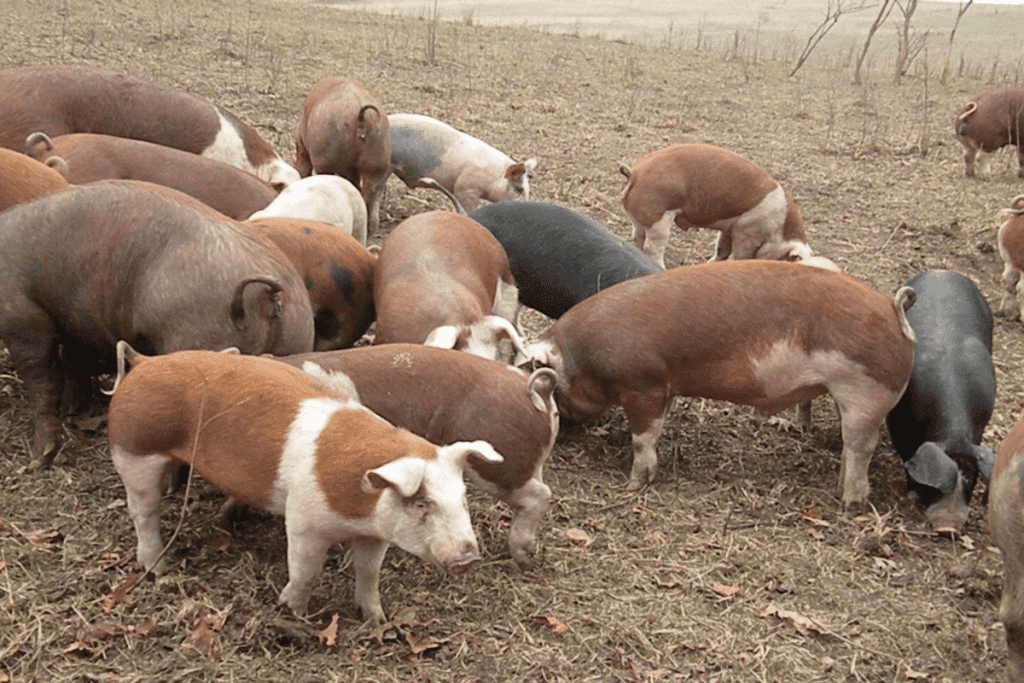
The Hereford pig is one of the most common breeds raised for meat and 4-H and FFA shows.
Hereford pigs are a good beginner breed of swine since they are easy to maintain and produce high-quality, lean meat.
Herefords are good rooters and tillers, well adapted to graze on pasture or live in a semi-confined area.
Ideally, they should have a nice fenced, outdoor area to roam.
Herefords are known to be very clean and shouldn’t require much work to maintain hygiene.
They will need protection from the sun to prevent their partially white coat from getting sunburned.
Their temperament is friendly and docile; another reason they are a popular choice among beginners and youngsters.
They are a generally healthy breed, not susceptible to disease.
The maximum size of a boar is about 800 pounds, and they will reach a slaughtering weight of 250 pounds in about 5 or 6 months.
Berkshire
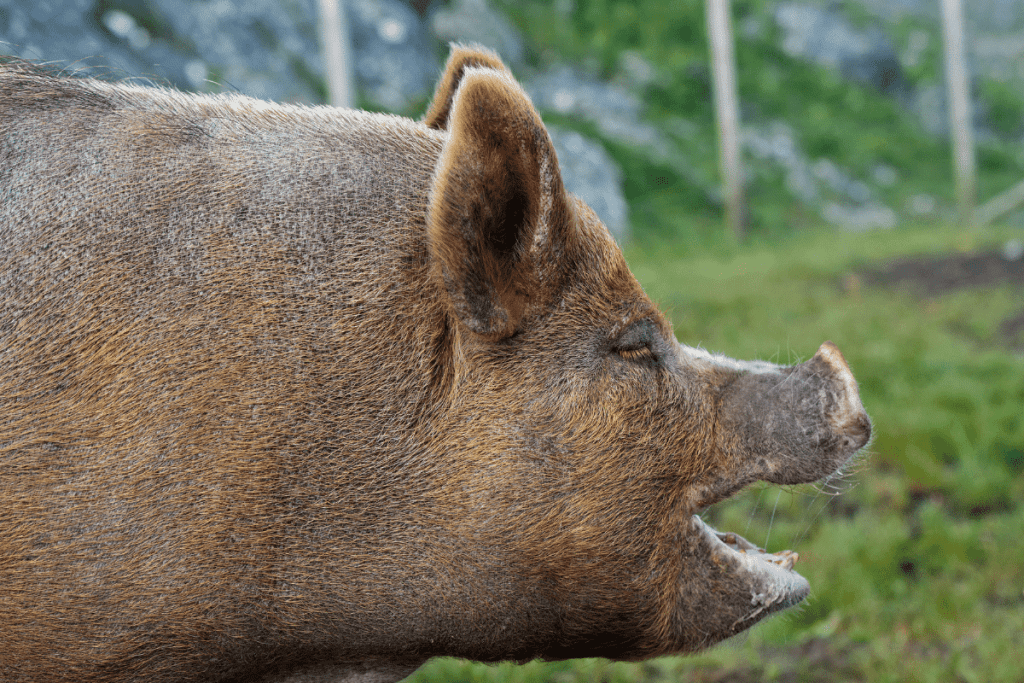
The Berkshire pig is another popular breed choice for a small farm.
This intelligent heritage breed produces very delicious dark meat.
Because Berkshire is one of the oldest pig breeds, they are very hardy and naturally well-suited for active foraging.
Their temperament is generally amiable and curious.
If you have pasture available to graze Berkshires, they will be very efficient at getting the nutrients they need from the land and require less commercial feed.
The mature weight of a Berkshire is about 600 pounds.
Their meat is known for its perfect marble, quality flavor, excellent texture, and water-holding ability.
Berkshire pork will provide you with a lot of quality food or fetch a reasonable price when this premium meat is sold.
Berkshire pigs will reach their market weight of 250 lbs in approximately 6 months.
KuneKune
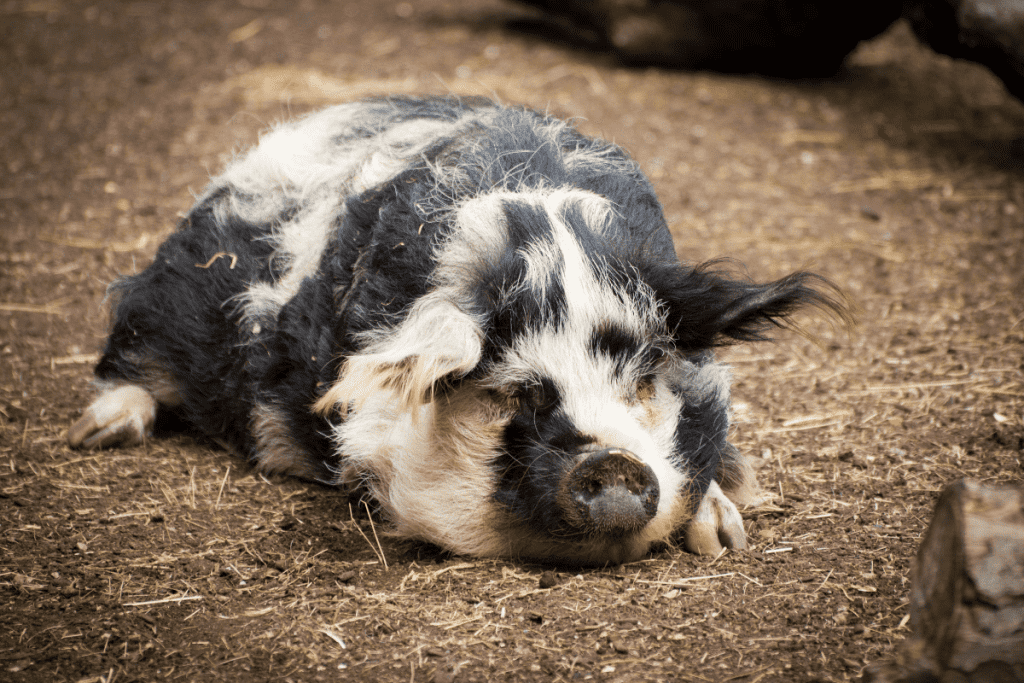
KuneKunes are small to medium-sized pigs from New Zealand with charming temperaments.
As one of the friendliest and docile breeds, KuneKunes are good for families looking for pigs to raise on their homestead.
This docile breed of pig maxes out at approximately 250 lbs, making them an adequate size for meat production.
Kunekunes produce a lot of fat, and their meat flavor is known for being rich and dark.
While some people love these meat quality traits, others prefer to use this breed of pig for lard.
Due to their short and upturned snout shape, they do not root as much as other breeds.
If you are concerned about aggressive rooting in your grazing area, the KuneKunes are an excellent choice.
When raised on pasture, KuneKunes will happily graze on grass, reducing your purchased food inputs, increasing soil fertility, and reducing the need to clean out manure.
They are somewhat cold-tolerant.
However, keep in mind you will still need a barn area and plenty of bedding for them during cold winter periods.
They are also less curious than other pig breeds, meaning they are less likely to outsmart and overcome your fencing system.
Yorkshire
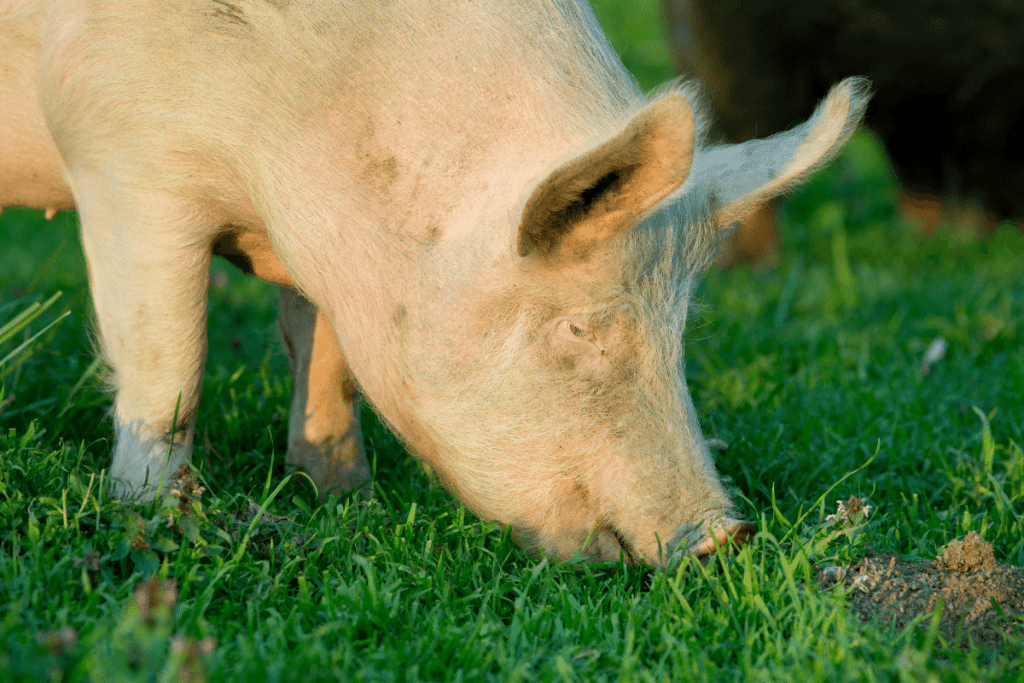
Yorkshires are wonderful pigs if you have a decent amount of space and are looking for a meat breed producing high-quality, lean meat.
Yorkshires are pretty active despite their large size, and they like to have ample pasture to wander in.
However, they are not very good foragers.
You will need to provide them will plenty of pig feed to keep them healthy and ensure a good quality of meat.
Although the muscular Yorkshires are slow-growing, it is worth the wait!
They are well known for their excellent bacon, pork chops, and ribs.
It takes up to 10 months for them to reach market weight.
A mature Yorkshire weighs up to 450-700 pounds.
Their thick skin allows them to thrive even in cold weather.
However, in the warm months, you will need to make sure they have shade and plenty of mud to wallow in to keep them cool.
As a pinkish-white breed, they require some shade to protect them from sunburns.
Yorkshires are also known for their good mothering ability, and they have very large litters, so they function well as breeding pigs in addition to meat pigs.
If you’re looking for the best place to get feeder pigs, check out our article.
Large Black
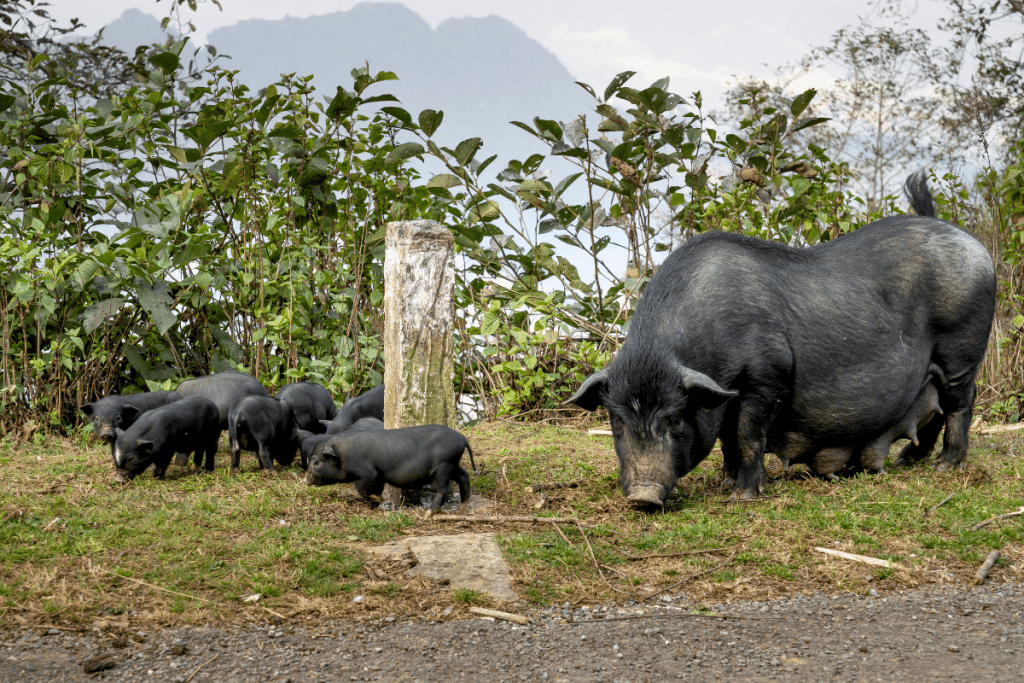
Large Black pigs are a very hardy meat breed originating from England.
These pigs are well adapted to outdoor living and are very good foragers as a heritage breed.
In addition to being a robust breed able to manage rough terrain and woodsy pasture, the quality of pork from Large Blacks is top-notch.
Many people rave about the bacon from Large Blacks and the flavor of their lean meat.
Due to their darker skin, they are also much more resistant to sunburns than other lighter pigs.
Large Black pigs are cold and heat-hardy, an excellent characteristic for those who want to raise their pigs in managed pasture year-round.
Large Blacks have a docile temperament, a great quality in such a large breed to ensure they are manageable.
As a bonus, this breed has very high fertility, and these excellent mothers can raise litters of up to 12 piglets.
Gloucestershire Old Spots
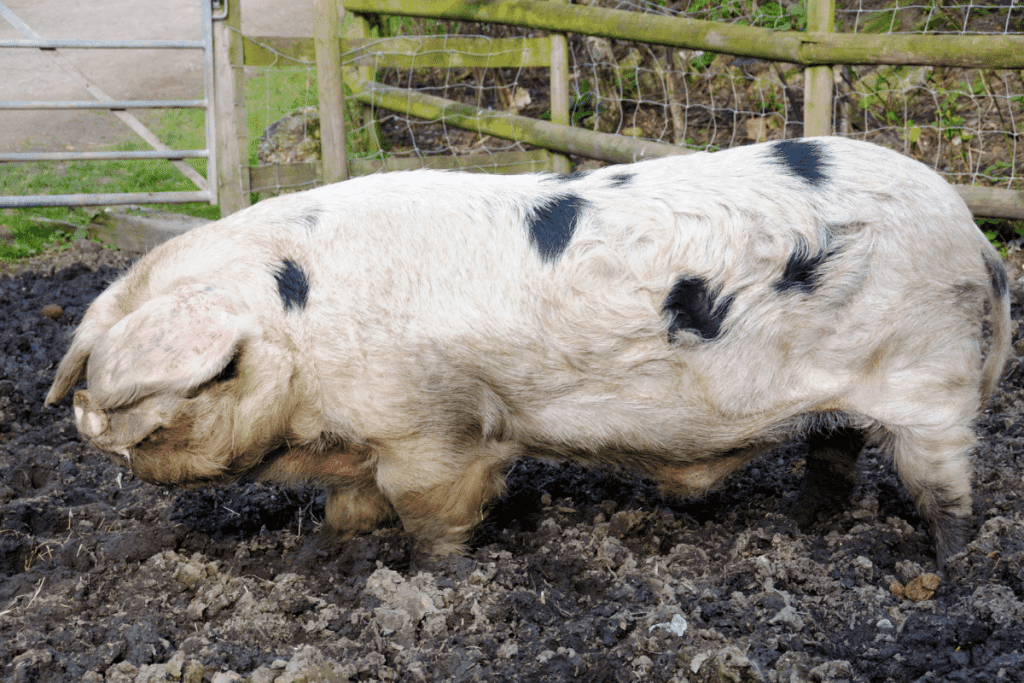
The Gloucestershire Old Spots was originally known as an “orchard pig,”
It was grazed in orchards to clean up fruit droppings and ate the fruit by-product from pressing cider apples.
They are pink-skinned, with black spots, broad bodies, silky hair, and cute floppy ears.
As a heritage breed, they are hardy foragers and grazers, and the pork quality you will get from Gloucestershire Old Spots is outstanding.
Heritage pork producers such as these provide meat with a bit more fat than commercial producers, imparting a rich and delicious flavor.
They are considered a dual-purpose breed great for both pork and bacon.
Gloucestershire Old Spots can live outside all year round, and they have a quiet, calm temperament.
Duroc
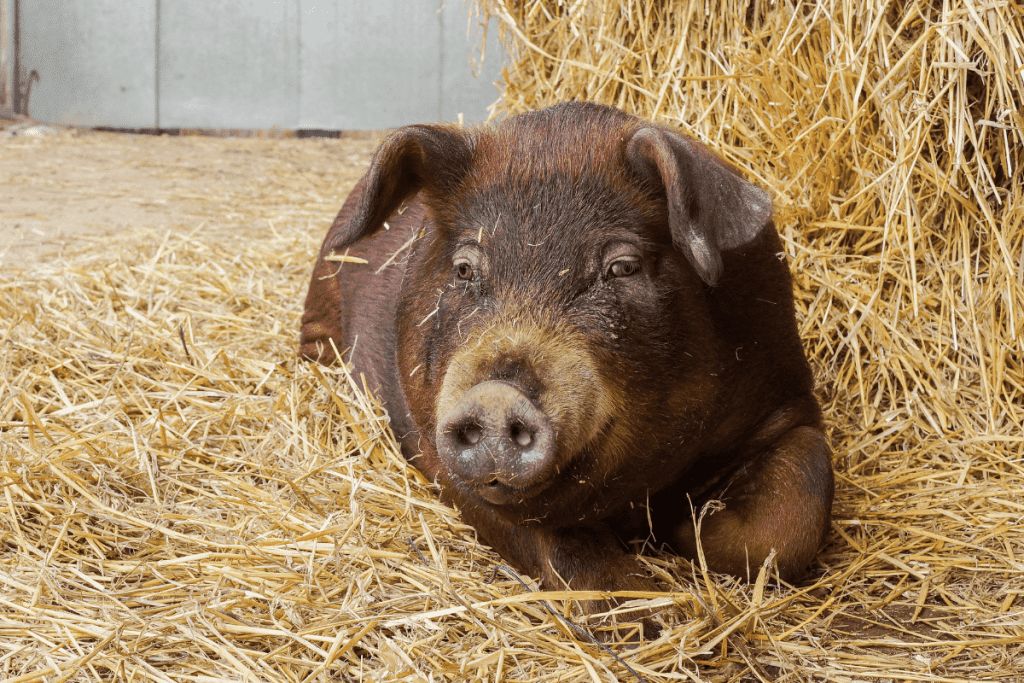
Durocs are among the more efficient pig breeds for the small farmer and homesteader due to their hardiness, good temperament, large litter size, rapid growth, and high-quality marbled meat.
They have a long body and are considered medium to large.
Duroc boars reach up to 800 pounds, and the sows reach 700 pounds.
These pigs grow pretty quickly, reaching their mature weight in 2 or 3 years.
Their tough skin and thick coats make them resilient in cold climates.
In addition, they can shed their coats in the summer and thrive in warm weather.
The Duroc meat is an intense red matching their reddish-brown skin.
They have a good fat to muscle ratio, producing very evenly-marbled cuts.
The meat is very flavorful and also holds moisture well.
Duroc pigs are also known to be docile, intelligent, and social.
Overall, the feed efficiency, hardiness, and friendly nature make the Duroc a good pig for meat, whether you are a beginner or a seasoned pig raiser.
As a prevalent breed, they are also easily accessible for purchase.
Tamworth
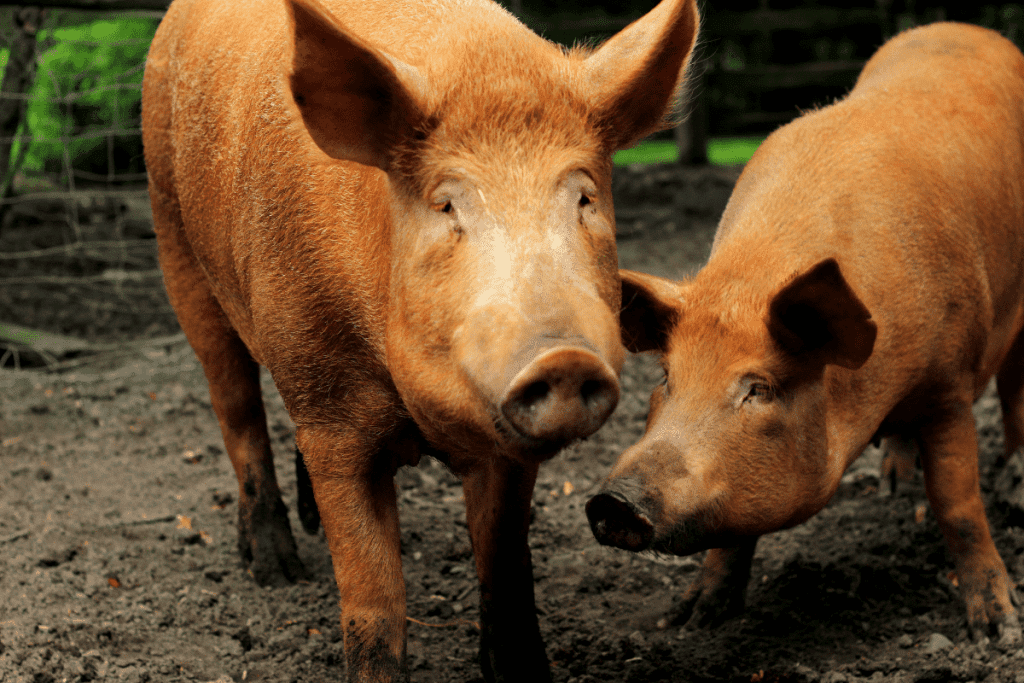
Tamworth is a heritage breed from Ireland with great characteristics for a family farm.
It was first imported to North America in 1882.
Although its species has been threatened in recent decades, it is increasing in popularity among people raising free-range organic pork.
Tamworths produce very lean and tender meat.
If you are looking for tasty yet healthy bacon lower in fat, the Tamworth pig is a solid choice.
However, because the Tamworths are pretty active, you will have to wait a bit longer for them to reach their slaughter weight compared to the average meat breed, approximately 25 to 30 weeks.
They do not like confinement, so these pigs are well-suited for farms set up for free-ranging pigs on pasture.
Their long heads and snouts are designed to help them forage and root in pastures.
Tamworth pigs are robust and built to withstand cold temperatures and wind.
Even in the winter months, they will be quite active and build muscle as they walk around grazing.
In hot weather, they require shelter with shade and adequate mud to keep themselves cool and protect themselves from sunburns.
These pigs have a friendly and social temperament towards other pigs and humans.
Hampshire
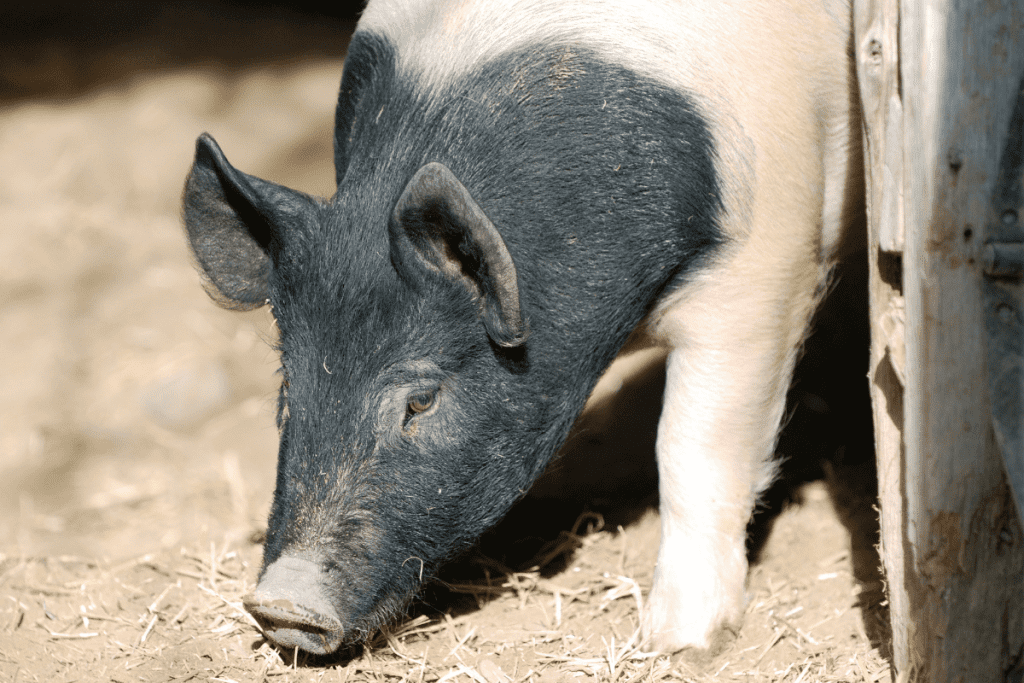
Hampshire is an old heritage pig breed, originally from the United Kingdom, with good meat quality.
Hampshire pigs weigh 550-650 pounds at their mature weight and are considered medium-sized and fast-growing breeds.
They have a distinctive coloration of a mostly black body with a white belt around the front legs and shoulders.
They also have upright ears, small eyes, and a medium-sized head.
Hampshires generally have a calm and docile temperament, although boars tend to become more aggressive when they mature.
The sows have excellent mothering instincts, and Hampshires are often used in cross-breeding to achieve leaner meat.
The Hampshire pig is a good forager and will be very efficient at converting its low-energy feed (primarily grains and vegetables) into lean meat.
Hampshires produce minimal back fat, large loin eyes, and fine-grained meat.
They also have thin skin and rinds, resulting in good carcass quality.
Although Hampshires prefer free-range, if you do not have a lot of pasture space for outdoor rearing, the Hampshire will tolerate confinement.
Chester White
Chester White is an American breed developed in Pennsylvania in the early 19th century.
It is a large and fast-growing pig with an average weight gain of up to 1.36 lbs per day.
The pork produced from Chester Whites is very fatty and savory.
Their meat is considered to be consistently high eating quality.
They weigh up to 550-800 pounds at their mature size.
The Chester White is among the more robust white breeds, although, as with previous lighter breeds in this list, they require protection from sunburn when spending time outdoors.
Good access to mud will also help these pigs apply their natural sun-protecting layer.
Chester Whites have a docile temperament, and they also make very good mothers.
The sows have high fertility rates and large litters of 10 or more.
In addition, Chester Whites are not susceptible to Porcine Stress Syndrome due to their lack of a particular gene carried by many other domestic pig breeds.
Landrace
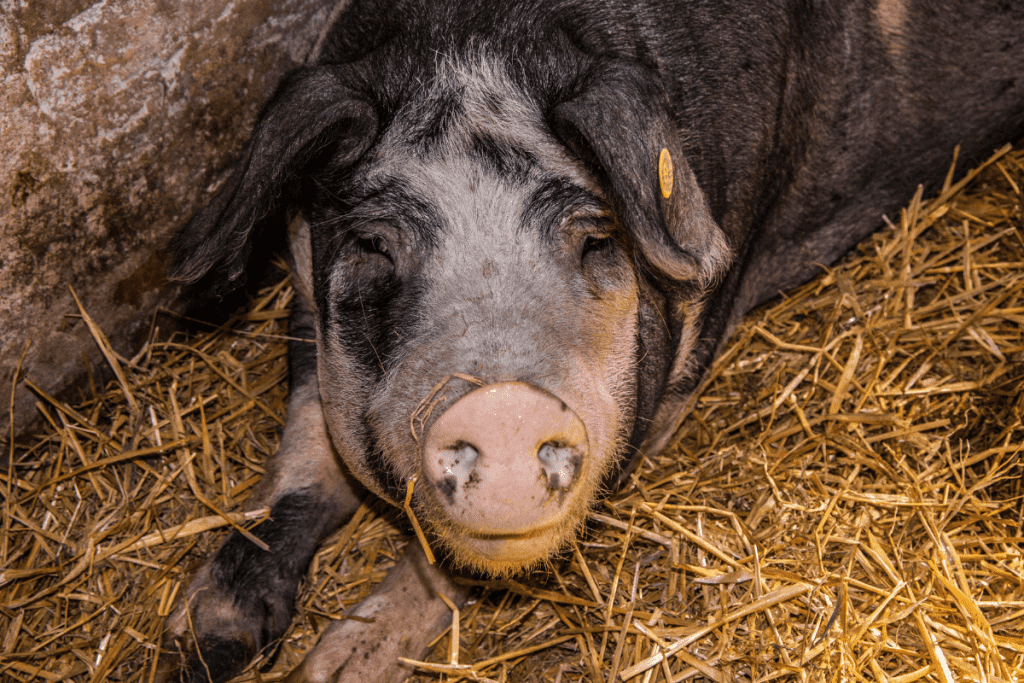
The Landrace is a commonly bred meat pig developed in Denmark.
It is similar in appearance to the Yorkshire with an all-white body.
The Landrace is a large breed with a particularly long body.
This long body structure results in more pork chops and more bacon per pig.
It is also a fast-growing breed, reaching a mature weight of about 500-600 pounds.
It is valued for its high percentage of meat, lean loin, and lean ham as a muscular pig.
Landrace pigs also cross well with other pig breeds and are often cross-bred to increase the size and improve the mothering ability of other pigs.
The mothers tend to produce large quantities of milk and large, vigorous piglets.
Concerning meat, make sure you know how much it costs to butcher a pig.
How useful was this post?
Click on a star to rate it!
We are sorry that this post was not useful for you!
Let us improve this post!
Tell us how we can improve this post?
